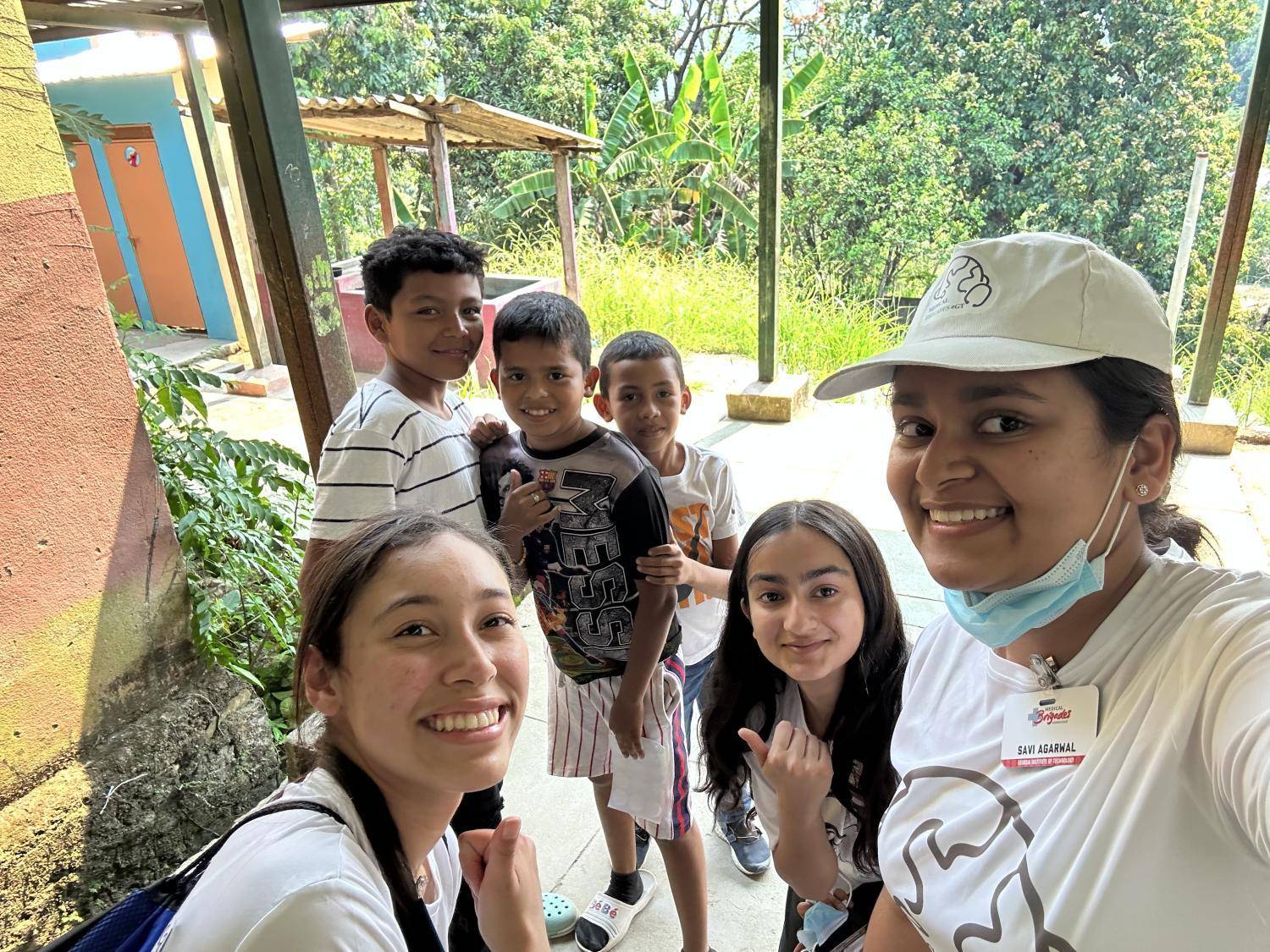In fact, “no” isn’t a word the 17-year-old second-year BME student uses very much at all.
(text and background only visible when logged in)
Savi Agarwal is a master of time management.
When she graduates in Fall 2023, she’ll have earned a bachelor’s degree in biomedical engineering and minors in international business, language, and culture and health and medical sciences — and she’ll have done so in only 2.5 years.
Between classes, she’s been involved with several pre-medical student organizations, volunteered at local clinics and hospitals, and done medical research. And as if there wasn’t enough on her plate, Agarwal is the founder of Medical Brigades, a Georgia Tech student organization dedicated to providing medical care to underserved communities.
Oh, and Agarwal is just 17.
“I haven’t said ‘no’ to anything, and I’ve never felt that being the youngest person in the room was an obstacle,” she said. “I think my age gives me a different perspective, and that helps me to be more understanding of people who also have different outlooks. Learning to have a multi-faceted perspective through all these experiences at Tech has been very meaningful to me, and keeps me motivated for medical school, residency, and beyond.”
Mission Abroad
In May, Agarwal led a 30-person Medical Brigades team to Honduras, where they served three communities and approximately 600 people. Over the course of a week, the team of 26 student volunteers, two doctors, a dentist, and a pharmacist set up a free medical clinic to provide OB-GYN services, prostate exams, general checkups, low-cost medications, personal hygiene supplies, and dental care.
They offered healthcare workshops on topics like anxiety, malnutrition, dental care, and adapting medical topics to one’s sociocultural environments.
The team also built 18 “eco-stoves,” enclosed cooking stoves for homes that lessen exposure to smoke and help prevent pulmonary diseases, particularly for women.
“We were immersed in the community; we lived with the people we were serving,” Agarwal said. “We didn’t have access to running water, consistent electricity, Wi-Fi, or cell service. Having personal relationships made our work that much more meaningful and helped me to understand the financial and medical toll of the healthcare system in Honduras.”
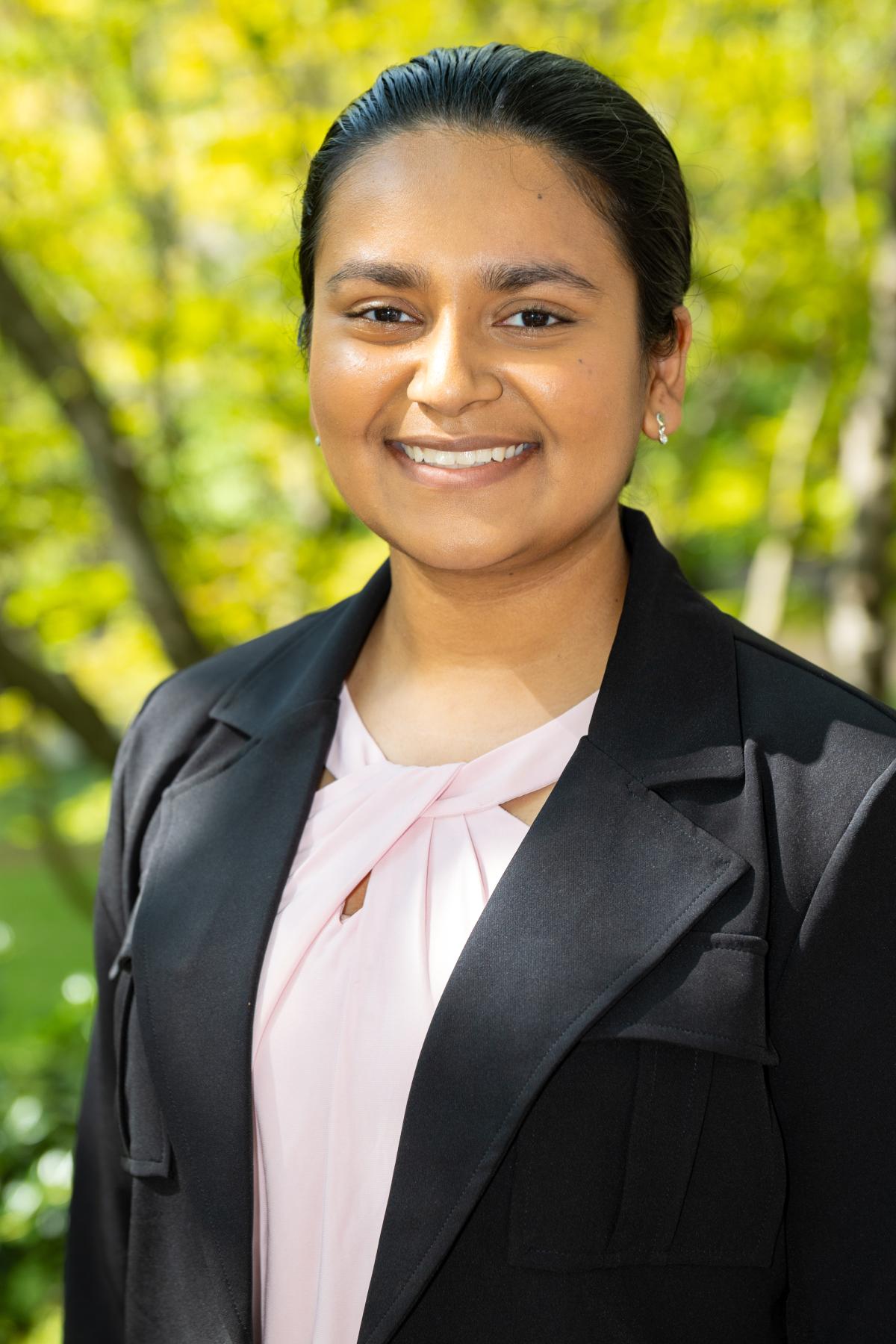
Savi Agarwal (Photo: Candler Hobbs)
Agarwal grew up in India and the United States, and she said the trip to Honduras brought up many parallels in lifestyle and lack of resources from her years in India. But she also saw a similar appreciation of life.
“People [in both countries] celebrate the fact that they’re alive and can support their families,” she said. “They recognize that the true gifts of the world are not materialistic, but about being in community together. The smallest and humblest homes have the brightest celebrations.
“It was a reminder to me that I want to support the people who represent where I’m from by sharing this attitude.”
(text and background only visible when logged in)
Learn more about Medical Brigades and their work.
(text and background only visible when logged in)
Driven to Serve
Agarwal said she knows the importance of a well-rounded education. In high school, she doubled up on Advanced Placement classes, qualified three times for the American Invitational Mathematics Exam, and led her Science Bowl team to a top-16 finish nationally, gaining a love for interdisciplinary science along the way.
She enrolled at Tech when she was just 15, decided on biomedical engineering for her studies, and took 21-credit semesters, motivated by her desire to learn from as many perspectives as possible.
Agarwal sprinkled in research on organ-on-chip devices; clinical rotations and volunteering; assisting with cancer care at Northside Hospital; and building collaborations between student clubs focused on social justice, medicine, and innovation.
A pivotal experience came when she began volunteering at the Clarkston Community Health Center just outside Atlanta. The free clinic serves a diverse community where many people lack insurance and live in poverty. There, she saw doctors and medical students helping people navigate barriers to healthcare that she said she encountered again and again as she shadowed at other hospitals.
“There are barriers beyond just financial stability, like housing, literacy, or even stigma due to a lack of education or experience,” Agarwal said. “Being able to directly help patients move past those blockages and reach a level of autonomy and well-being where they don’t have to come back is very dear to my heart.”
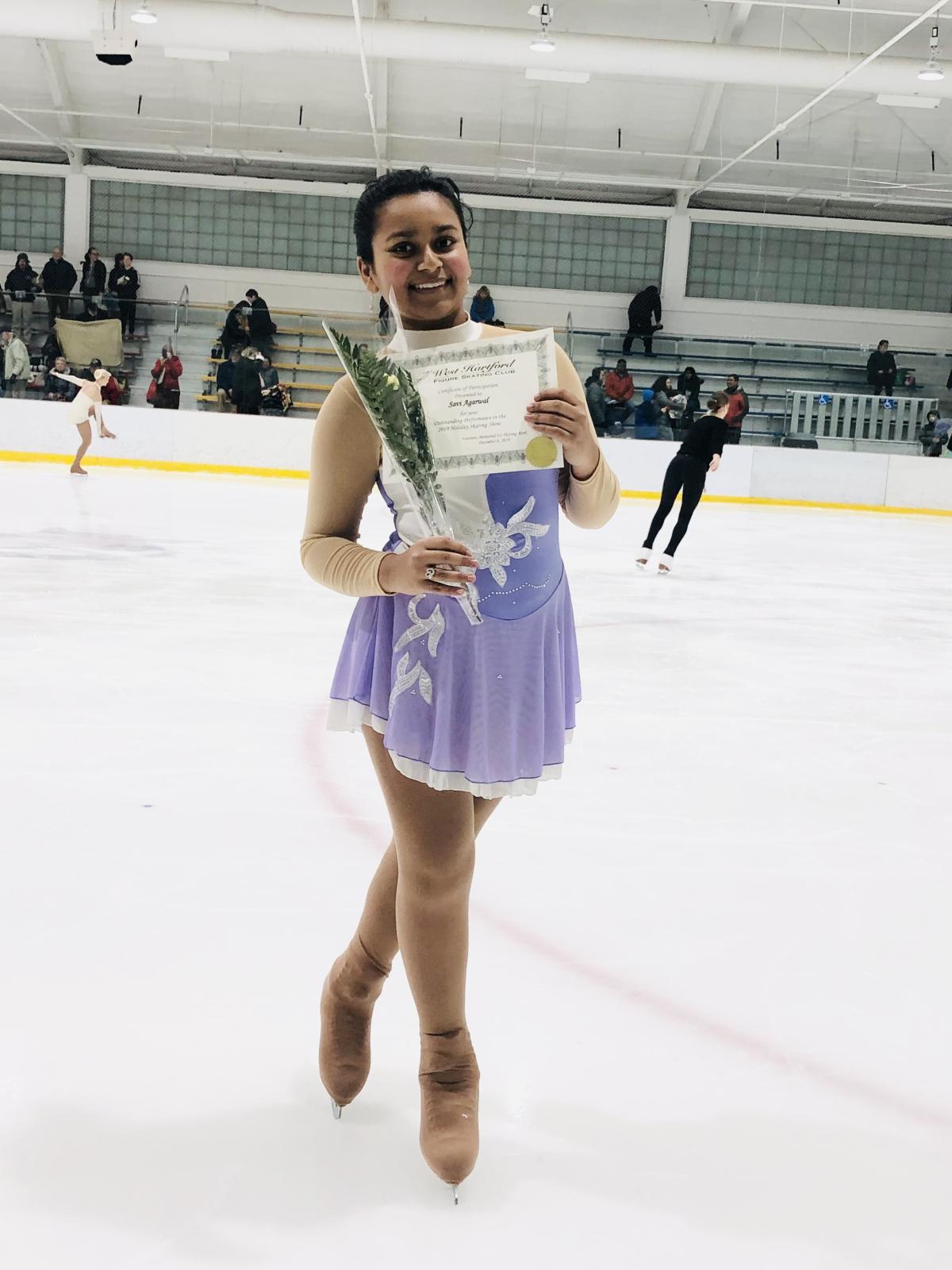
Figure skating is one of the ways Agarwal balances her demanding academic and extracurricular pursuits.
That passion for serving disadvantaged patients led Agarwal to start Medical Brigades. In addition to international trips, the organization partners with local clinics like the Clarkston Center to assist with medical services. With graduation looming, Agarwal plans to expand the organization beyond Georgia Tech to stay involved in the community.
Finding Balance to Stay Motivated
With the goal of continuing to serve needy communities, Agarwal hopes to get into medical school and has her sights set on Emory University. She hopes to learn to serve patients holistically, with empathy, global perspective, and emotional intelligence.
“In the long run, I’d like to combine my medical work with my passions for leadership and culture,” she said. “Maybe I’ll work in a rural hospital, or even just be involved with an administrative campaign for a region. But my goal right now is to gain the medical knowledge I need; the first step is to become a respectable physician who can really support her patients.”
Between graduation and starting medical school in Fall 2024, Agarwal is planning the next Medical Brigades trip — this time to the Dominican Republic, with a focus on providing clean water to the communities they visit.
Agarwal admits her schedule is packed, calling her time at Tech an “avalanche of experiences.” But she said she’s learned habits along the way that help her find balance.
She makes time away from work a priority, playing tennis, swimming, and skating (she’s vice president of the Georgia Tech figure skating club). She sings Indian classical music, plays the piano and the flute, and loves listening to K-pop.
She’s also a big fan of the Marvel Cinematic Universe: “Give me a line, and I’ll quote you the whole scene,” she said. She watches a movie almost every day, saying that it gives her time to “not think about what happens next.” She prioritizes spending time in nature and with her family, which helps her to stay grounded and in the moment.
Agarwal said she recognizes her journey so far has been unconventional, but she also knows it’s true to who she is.
“I’m not trying to tell anyone that they should do what I’ve done,” she said. “But I want people to know that if there’s something you want to do, and you’re hesitant because it’s unconventional, then just go for it.”
(text and background only visible when logged in)
(text and background only visible when logged in)
Related Stories
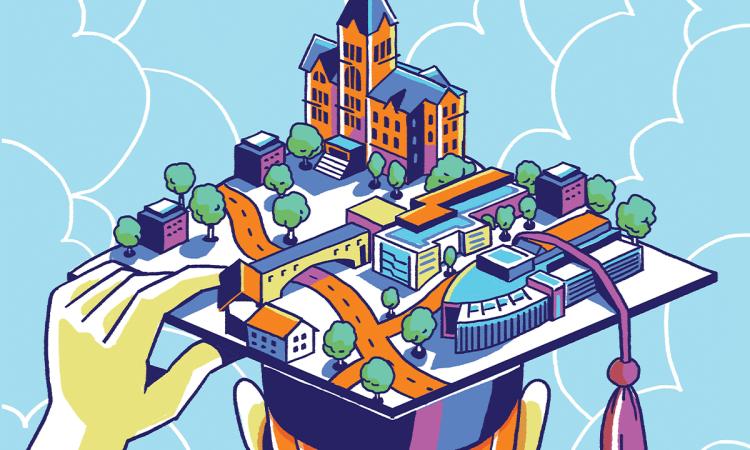
Think Big and Be Bold
25 years after creating a powerhouse program between a public and private university, Georgia Tech and Emory’s biomedical engineering department looks ahead to its next chapter.
(text and background only visible when logged in)
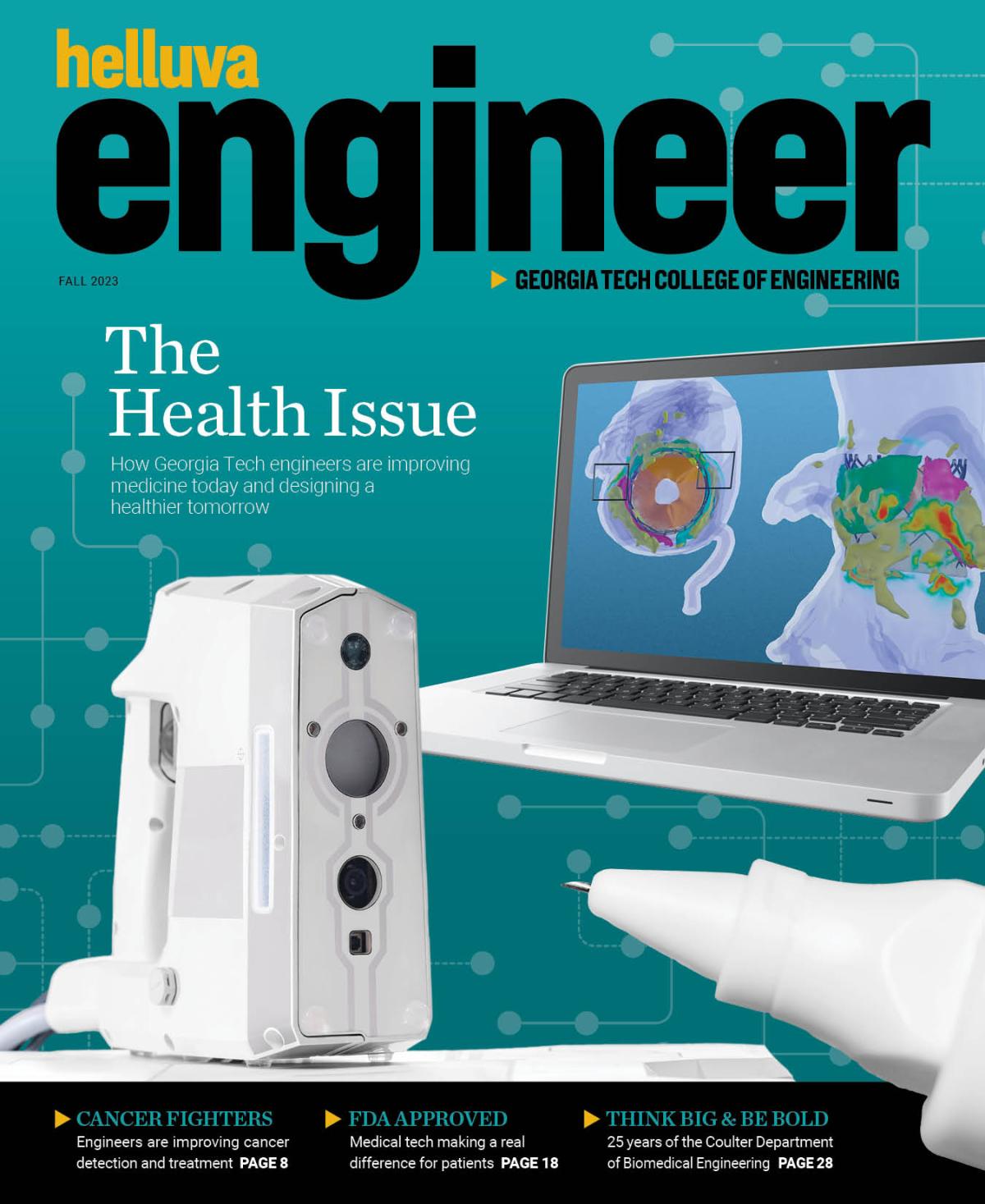
Helluva Engineer
This story originally appeared in the Fall 2023 issue of Helluva Engineer magazine.
With the top biomedical engineering program in the country, it’s only fitting that our rebooted College magazine focuses on health and medicine in our return issue. From cancer to anemia, synthetic biology to eye disease, Georgia Tech engineers are improving medicine today and designing a healthier tomorrow for us all.
